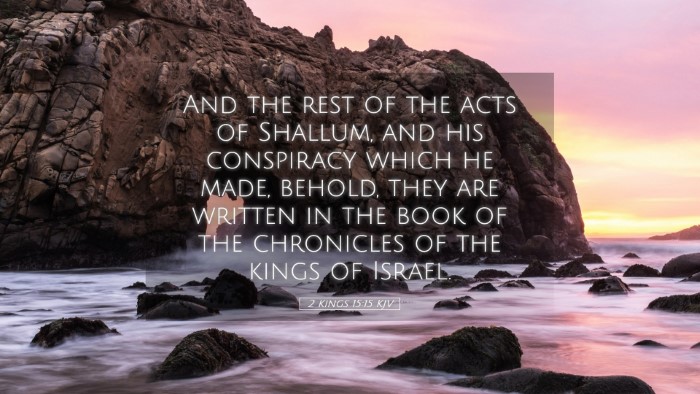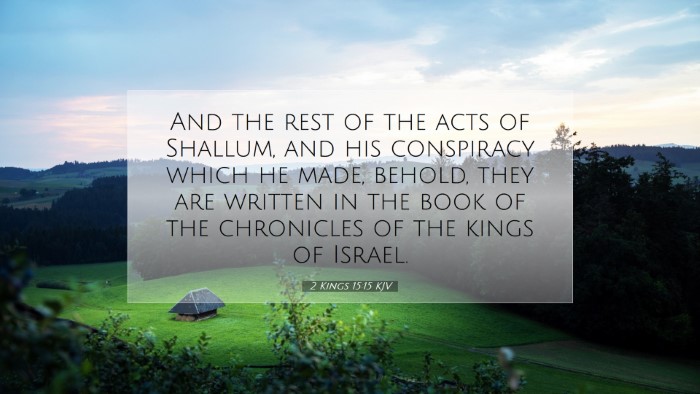Commentary on 2 Kings 15:15
Verse Text: "And the rest of the acts of Shallum, and his conspiracy which he made, behold, they are written in the book of the chronicles of the kings of Israel."
Introduction
The passage under consideration, 2 Kings 15:15, provides a brief account of Shallum's reign and his violent ascension to power in Israel. This commentary will explore the political intrigue surrounding Shallum's claim to kingship, the theological implications of such an event, and the historical context provided by various public domain commentaries.
Contextual Background
Shallum reigns in a time marked by turmoil and instability in the Northern Kingdom of Israel. His succession follows a series of assassinations and coups, underscoring the political chaos prevalent during this period. This verse encapsulates Shallum's brief reign and invites a further examination of the broader historical narrative of kings in Israel.
Insights from Commentaries
Matthew Henry's Commentary
Henry emphasizes the fleeting nature of Shallum's power, noting that his reign is characterized by violence and usurpation. He reflects on the moral implications of rulers who seize the throne through assassination, suggesting that such actions lead to divine judgment. Additionally, Henry points out that Shallum's short reign (only one month) serves as a reminder of the instability of human authority when it arises from sin and conflict.
Albert Barnes' Commentary
Barnes provides a detailed analysis of the phrase "the rest of the acts of Shallum," indicating that Shallum's acts were recorded in the official histories of Israel. He stresses the importance of these chronicles in understanding the legitimacy of the rulers and their actions. Moreover, Barnes underscores that the brevity of Shallum's reign is indicative of the lack of divine endorsement for his actions.
In his commentary, Barnes also reflects on the role of political conspiracies in Israel’s history, drawing parallels with the moral decline that led to societal upheaval.
Adam Clarke's Commentary
Clarke approaches the text with an emphasis on the nature of Shallum's conspiracy, analyzing its roots and consequences. He points out that Shallum rose to power through the assassination of King Zechariah, similar to other leaders who gained power through betrayal. Clarke also notes the historical significance of the Chronicles of the Kings, stating that these records serve not only as a political document but as a testimony of God's providence, revealing His sovereignty over the rise and fall of leaders.
Theological Reflections
The narrative surrounding Shallum's reign raises important theological questions about divine sovereignty and human agency. The text presents a stark reminder of the discrepancies between divinely appointed leaders and those who usurp authority for selfish purposes. It invites readers to contemplate the consistent theme throughout Scripture: God’s ultimate authority prevails amidst human failure.
- Divine Judgment: The text suggests that human actions have consequences and that rulers who act outside of God's will face judgment.
- Human Authority: The instability of Shallum's reign serves as a case study on the transient nature of power; it demonstrates how human authority is often built on shaky foundations.
- Historical Record: The mention of the Chronicles underscores the significance of recorded history in understanding God's plan and the nature of leadership within His sovereignty.
Conclusion
In examining 2 Kings 15:15, we see not only the historical account of Shallum's conspiracy but also the rich theological implications embedded in this narrative. The insights gathered from the public domain commentaries provide a multi-faceted understanding of the scripture, offering valuable lessons for pastors, students, and scholars alike. Shallum's brief and violent reign serves as a cautionary tale regarding the nature of authority, the moral responsibilities of leaders, and the overarching sovereignty of God in human affairs.


